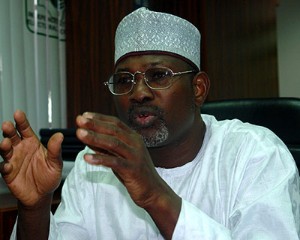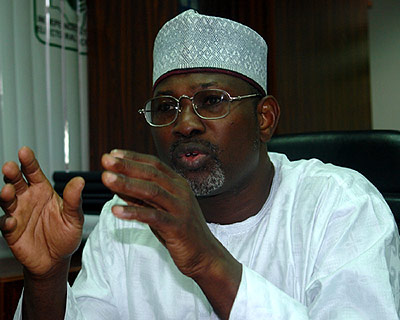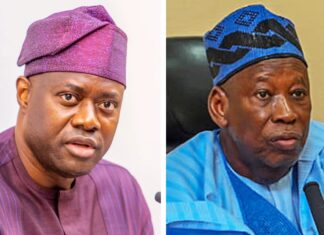Last week’s wobbly issuance of PVCs by INEC in some states raises fears on the commission’s preparedness towards 2015, writes Senior Correspondent, ISHAYA IBRAHIM.

The issuance of Permanent Voters Cards (PVC) in Lagos by the Independent National Electoral Commission (INEC), witnessed three major problems ranging from inadequate awareness, shortage of personnel to poor timing.
These glitches left more than half of Lagos electorate unable to collect their PVCs, a crucial voting document. The fear, thus, is unless they sort things out in INEC’s local offices around their neighborhoods, they would be ineligible to vote on February 14 and 28, 2015 general elections.
The capacity of the INEC to conduct hitch-free elections in 2015 has been the issue raised by the exercise.
The commission had fixed Friday, November 7 to Sunday, November 9, for the distribution of the PVCs in 13 states, including Adamawa, Borno, Edo, Imo, Kaduna, Kano, Katsina, Lagos, Nasarawa, Niger, Ogun, Plateau and Rivers. It had earlier distributed the cards in 24 states.
Except for Adamawa, Katsina, Niger and Plateau, which are controlled by the Peoples Democratic Party (PDP), the other nine states are under the All Progressives Congress (APC).
From the states
When the exercise went awry, especially in Lagos, chieftains of the APC suspected foul play. Perhaps, they had reasons to feel so. On the first day of the exercise, INEC officials were not seen in the various polling units designated for the distribution of the PVCs.
The following day, reports indicated that the commission’s staff came to various collection points very late, and by 4pm, they had left, achieving little.
The problem was further complicated by the merger of four or more polling units into a collection centre, with two officials assigned to deal with the thousands of the electorate there.
In the collection centres visited by TheNiche, the designated INEC staff assigned could not cope with the crowd of angry electorate waiting for their cards.
On the third day, at Akinajo Street, Ajuwon, in Ifako Ijaiye Local Government Area of Lagos State, an INEC official told TheNiche that he had more than 10,000 PVCs yet to be distributed. He said he could not sort out the cards of the waiting collectors because they were too many. To speed things up, he resorted to calling out their names alphabetically. That also turned out to be clumsy. In anger, many eligible voters left.
The governor, Babatunde Fashola, accused INEC of foul play.
“I am deeply disappointed at this display of lack of planning that speaks volumes of the contempt and disregard of this national agency for the rights of citizens,” he said.
“I wish to recall that it was INEC that first announced that this exercise was planned for August, and later shifted to September, and later to today and yet they did not get it right.”
In Ogun, it was also tale of confusion, as residents, who trooped out for their cards on the first day, got disappointed. No INEC staff was available to attend to them.
The following day, the governor, Ibikunle Amosun, engaged INEC Federal Commissioner in charge of the South West, Professor Lai Olorede, over the shoddy handling of the exercise.
Olorode assured him that “every registered voter” would get the PVC before the general elections. But Amosun furiously asked him: “How is that possible when two days into the exercise, less than 10 per cent of the people of the state had collected their cards.”
The governor lamented that the hitches and irregularities noticed on the first day of the exercise worsened on the second day, confirming the fears of critics that PDP may have planned to sabotage the exercise ostensibly to disenfranchise eligible voters in the state.
The confusion also extended to Rivers, another APC state. A day before the exercise, the state’s Resident Electoral Commissioner (REC), Aniedi Ikoiwak, announced the commission’s readiness to issue PVCs in all the 23 local governments. The governor, Rotimi Amaechi, declared the day work-free for Rivers people to collect their cards.
The REC later announced that due to problems of logistics, the PVCs would only be distributed in seven local governments.
On that day, the Supervisory National Commissioner of INEC in charge of Rivers, Cross River and Akwa Ibom states, Thelma Eremiren, said the exercise would no longer hold in Rivers owing to technical challenges, adding that all registered voters in the 23 local government areas in the state would collect their PVCs between November 28 and 30.
The distribution of the PVCs was also problematic in Kano State, especially in Dawakin Tofa Local Government Area, where in the council’s 10 wards, only two had their cards ready for collection. The hitches also extended to Gezawa and Nasarawa local governments of the state, with reports indicating that the PVCs were unavailable in many polling units.
Lamenting the situation, Governor Rabiu Kwankwaso of Kano urged the INEC to correct the lapses by ensuring that every eligible voter got their cards.
In Imo, there were little complaints in the distribution of the PVCs. The process was generally smooth across many local governments, except for a few that experienced hiccups.
The governor, Rochas Okorocha, asked INEC to ensure that it keeps to its promise of giving every eligible voter in the state their voters’ cards.
In Edo, there was confusion, as INEC said that about 4,658 PVCs were snatched in various places in the state during the distribution.
Edo REC, Baritor Kpagih, said the PVCs were snatched in nine local government areas of the state, including Orionmwon, Etsako West and Ovia North East. He explained that 3,661 PVCs were snatched in eight units of different wards in Orhionwon Council alone.
In Borno and Adamawa states, the PVCs could not be issued there due to security reasons.
Rigging from source?
Chairman of Lagos State chapter of APC, Henry Ajomale, said the bungling of the exercise by the INEC was deliberate, to disenfranchise Lagos voters.
“Yesterday (November 6) at our meeting with the INEC, all political parties, including the APC, voiced their anxiety about the unpreparedness of the INEC for the distribution of the PVCs. We have been vindicated. We said they should postpone the exercise till November 28 when the second phase will commence. They refused,” he said.
APC alleged that the three-day distribution of the PVCs in 12 states was intentionally programmed to fail in order to disenfranchise voters in the states under its control.
“There is no doubt that this programmed incompetence has emanated from just one source, the ICT (information and communication technology) unit of INEC, with the intent of sabotaging the PVC distribution process in key states, hence we are calling on INEC Chairman, Attahiru Jega, to institute an internal inquiry into the botched exercise with a view to fishing out the fifth columnists who are behind the sabotage, meting out the necessary punishment to them.
“If INEC is to organise a free, credible and transparent election next February, it must quickly return to the drawing board to fashion out how to ensure that all Nigerians, who are eligible to vote, are able to do so without hindrance, and also purge itself of the fifth columnists within its ranks who are bent on sabotaging the elections,” the party stressed.
The party said it was curious that most of the affected states (Kaduna, Kano, Edo, Plateau, Ogun, Imo, Borno, Rivers, Lagos, Nasarawa, Katsina, Niger) are either opposition strongholds or harbour the highest number of voters.
“This is highly suspicious, against the background of available information that the PDP-led federal government is working to disenfranchise voters in opposition strongholds during the forthcoming polls,” it said.
APC national leader, Bola Tinubu, added that INEC and the presidency colluded to rig the 2015 election.
“You (INEC) have not been able to rectify the anomalies, irregularities that might be involved. You have not been able by now to even start the exercise of those who are 18 years and above that should be captured and given the right to vote. And you will have 30 days minimum, according to the Electoral Act, to display the comprehensive voters register,” he charged.
Names missing in Lagos register
There is also the complaint that a whopping 1.4 million names were missing in the Lagos voter register.
INEC, however, denied that it deleted some voters in the Lagos voter register. Kayode Idowu, spokesman to the INEC chairman, said: “In particular, it is completely false that INEC has removed the records of 1.4 million persons from the register of voters compiled in 2011 in Lagos State.
“It is true that at the end of the 2011 general registration exercise, the commission announced a figure of 6.1 million registrants in the state. But when that data was subjected to the Automated Fingerprints Identification System (AFIS) software, 82,892 multiple registrations were eliminated. Also, there was the technical challenge of loss of data and incomplete data affecting about one million records – mostly in 1,792 polling units that were identified and made public before the present exercise.
“That was how the post-business rule figure for Lagos State (on the basis of which PVCs were printed) came down to about 4.6 million registrants. For the avoidance of doubt, a pre-acknowledged data loss and incomplete data of some registrants is not a ‘conspiracy’ issue as has been alleged by some notable persons. It is a back-end technical challenge that is far from sealing the fate of affected persons, and for which INEC has already put in place measures to ensure redress,” he stated.
Idowu, however, said the commission has made provision for eligible persons for whom PVCs could not be printed due to data loss or defective data to come out from Wednesday, November 12, to Monday, November 17, 2014 for their data to be recaptured.
“In special consideration for the 1,792 polling units in Lagos State where the challenge of data loss is much pronounced, the CVR (continuous voter registration) will take place at the polling unit level, as against the Registration Area (RA) level in other parts of the state,” he remarked.
Eyes on INEC
Nigerians are already getting apprehensive of what would be the reliability and validity ratings of 2015 polls, if these observed lapses are not corrected before the general elections. This is especially as the country has not really had it good when it comes to elections. In fact, the impression has been that Nigeria’s democratisation process has at different occasions been bedevilled by badly conducted elections.
Curiously, Jega, on his appointment, had assured Nigerians on the agenda of his commission to put the nation’s electoral process in line with standard practice. Though he has at different occasions listed challenges faced by his commission in this regard, he has also assured that efforts were being put in place to institute an electoral process that would be adjudged credible by international standard.
Not too long ago, for instance, the INEC chair had, at a forum organised by the Department of Sociology, Faculty of Social Sciences, University of Lagos, told the participants that the commission was fully prepared to conduct credible elections in 2015, despite challenges.
“As far as INEC is concerned, the 2015 general elections will see Nigeria take its rightful place in the comity of nations where electoral democracy is being consolidated,” Jega had pledged.
He said the commission had learnt a lot from the experiences of the 2011 elections and had taken measures, especially in the last 18 months, to conduct a better election in 2015.
“Learning from the experiences of 2011, especially regarding the need for early preparations, the commission has undertaken the task of fundamental restructuring of its bureaucracy.
“It has established new policies to guide its work and embarked on far-reaching planning of its operations through a strategic election project plan and election management system,” Jega said.
He explained that the commission had concluded plans to issue all duly registered voters with PVCs which would be swapped with card readers to ensure 100 per cent voter authentication.
While Jega reeled out measures by his organisation to ensure credible election, he was lionised by his audience.
Actions by the commission, however, seem to point to the contrary. Aside the PVC distribution flop, another initiative by INEC that had stirred controversy was the attempt at creating additional polling units in some parts of the country.
Critics promptly alleged that the manner with which INEC embarked on the exercise portrayed it as intending to favour some sections of the country against others. It took a bold intervention of the National Assembly for Jega and his colleagues in INEC to retrace their steps on the contentious exercise.
What particularly baffles observers on INEC’s recurrent faulty steps is that the current electoral umpire is seen as the most favoured so far in terms of liberal budgetary provisions. In fact, the argument in enlightened circles is that the budgetary allocations extended to Jega’s INEC so far may have exceeded national budgets of some countries in the continent. Whether operatives of the commission appreciate that as reason for which Nigerians should be entitled to credible election remains another issue.















